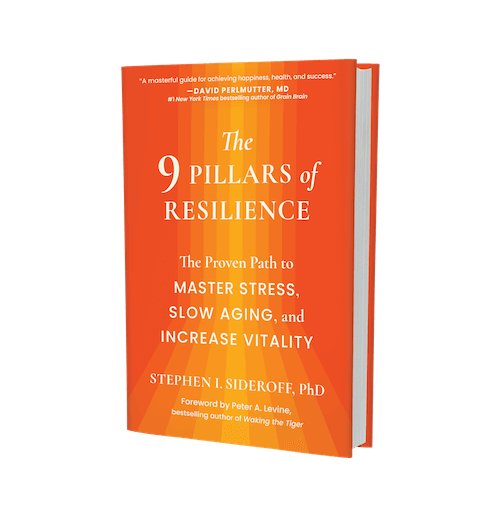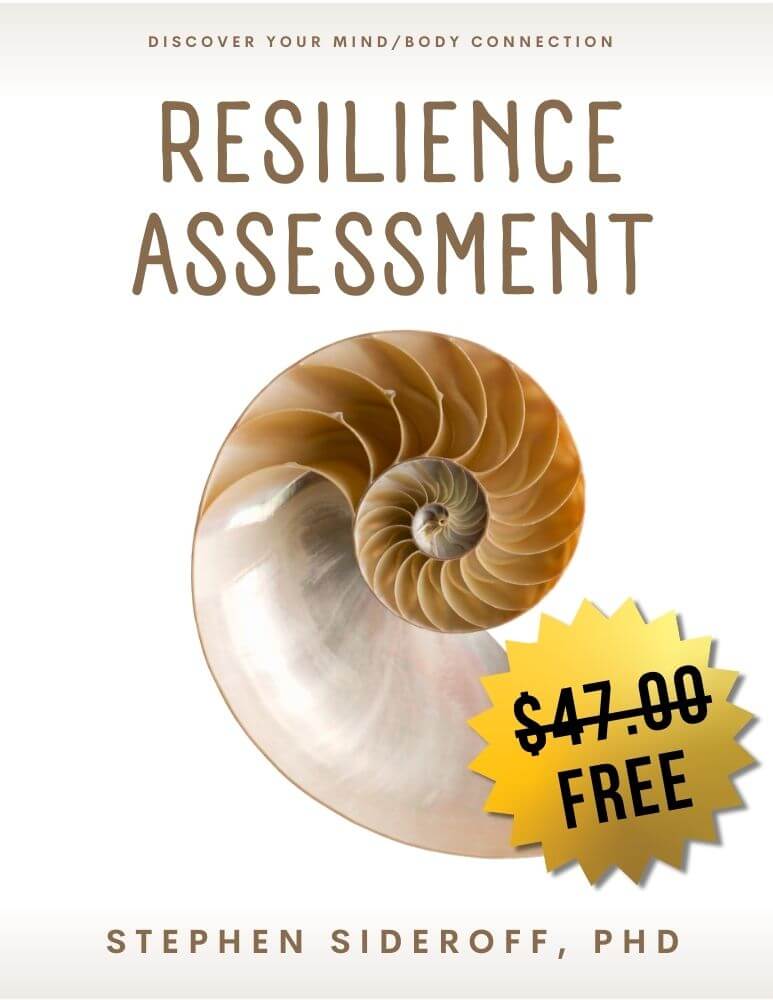I met Dr. Stephen Sideroff by divine accident.
In Palm Springs, CA, for a quick solo getaway, I was feeling particularly disheartened about my wellness path. I had devoted the past two years to prioritizing my physical, mental, and emotional health, and yet there were major holes in my understanding of how it all worked and I was having serious doubts as to whether I was on the right path at all.
I was on the verge of giving up.
As I began to drive away from my hotel, I found that I had forgotten something inside. I went back in and happened to stumble into an event featuring Dr. Sideroff, an internationally-recognized expert in resilience, optimal performance, addiction, neurofeedback and alternative approaches to stress and mental health. He was there to speak at a closed luncheon and after a few minutes of conversation, he invited me to sit in. I resisted, even leaving the hotel, but something told me to go back. I did.
Dr. Sideroff’s presentation, in light of my personal process and unanswered questions, was nothing short of mindblowing. He broke down the science and research behind why some of us respond to life differently from others, what works, and why it works. It was exactly the link I had been missing.
Over the next few months, I worked my way through Dr. Sideroff’s extraordinary book, The Path: Mastering the Nine Pillars of Resiliency and Success. I found the material to be so enlightening, so comprehensive, that I could only digest a few pages at a time. Its approach, insight, and guidance for practical application of resiliency principles set off a series of breakthroughs that helped me make new connections and shift old perspectives.
At the peak of an impactful career in research and application, I asked Dr. Sideroff to share more about his own path.
What inspired you to choose your career path?
The challenge of learning how the brain works coupled by how to use this information to help people function at their best. The latest development of the brain is at the forefront of the evolutionary process. Is there a way to influence this process?
What is your favorite thing about what you do?
Being able to help people live a better life, heal from emotional and physical wounding, and then being rewarded by seeing the results of this process – first hand. Also, the diversity of activities I am able to engage in: teaching, research, clinical work, consulting, corporate workshops, remote workshops, mentoring, and program development.
What was a major turning point in your career?
I was an assistant professor in the psychology department at McGill University in Montreal. I was doing research on the mechanisms of learning and memory in the brain. At the time, McGill was one of the premier universities in the world in neuroscience. I was able to meet and become friends with D.O. Hebb as well as hear one of Wilder Penfield’s last lectures and sit with Pierre Gloor above the neurosurgery amphitheater as Theodore Rasmussen mapped the brain by stimulating different cortical areas of a patient’s brain.
But I wanted to be able to communicate with those I was working with and I couldn’t do it with the animals who were my research subjects. I wanted to switch into more clinical work.
I discovered that there was new type of fellowship program started by the newly-created National Institute of Drug Abuse for those with PhDs wanting to go into addiction work. I applied for this post-doctoral fellowship and hooked up with a professor at UCLA to sponsor it. I then took off for a year traveling through Europe and Africa.
In April of the next year, while arriving in Paris, I received a frantic message from my McGill secretary: “Where are you? You were awarded the fellowship and it starts in July!”
So, my clinical career began and my work in addiction began – both at UCLA and at the VA Brentwood, where I founded a naltrexone treatment program.
Tell us more about the mind-body-spirit connection in optimal health.
When a doctor says, “it’s all in your head” when their diagnostic tests turn up nothing, they are not accurate. Nothing stays in the head. Our thinking and our emotions and are linked with our body. The area where this is most obvious is in the stress response where both emotional and cognitive factors impact our body’s physical reactions. This leads to impairment in physical, emotional and mental factors. One of my nine components of resilience, “relationship with something greater,” includes spiritual factors that can help modulate the stress response.
In your talk, you referenced everything from addiction to migraines to cancer. Are all maladies the same at their core?
While they are not necessarily the same at the core, they all have something in common: Autonomic dysregulation. Our stress response contributes to the dysregulation of our autonomic nervous system. This dysregulation leads to the body struggling to cope with ongoing demands of daily life, along with stress. The result is breakdown somewhere in the body as well as in emotional and mental functioning.
To what degree are illnesses or conditions with a psychological component something people are born with versus products of their environment?
There has always been the debate: nature versus nurture. But in recent years with the discovery of neuroplasticity and more importantly, epigenetics, it appears that nurture is winning out. We now know that the expression of certain genetic factors will only occur under certain environmental/intersocial conditions. In other words, genetic expression itself is influenced by one’s social environment.
It seems that the most literal interpretation of practicing positive psychology is “you get what you expect;” that everything is a result of attraction. Where is the line between people taking responsibility for their health and well-being, versus blaming those who are sick?
We have to be very careful here and not blame people who develop certain diseases.
But at the same time there is always a personal component to the results we get in the world. This personal component, therefore, is the responsibility of all of us.
We say that most diseases these days are diseases of “lifestyle” which means that our behaviors play a big role. This includes how much stress we put ourselves under (after all, some of this is voluntary), how we deal with that stress, how easily we let go of that stress. Who we choose as our important relationships – in short, all the factors I identify in my Nine Pillars of Resilience.
Where is the American approach to wellness getting it wrong – what would you like to see change in terms of how we approach health care?
Wellness is about all levels of relationship. In many respects, unlike, say, in Europe, we have a more independent attitude, a “go it alone” mentality; that has people feeling more isolated and less supported in life. This is a cultural perspective that engenders greater stress in our lives → leading to greater physical and emotional breakdown.
More emphasis in healthcare should be devoted to helping people cope better, deal with stress better. There should be greater emphasis, for example, on educating pregnant women as well as giving greater support and education optimal ways of raising and supporting children as they grow up.
Dr. Stephen Sideroff is Assistant Professor in the Department of Psychiatry & Biobehavioral Sciences at UCLA’s School of Medicine, as well as the Director of the Raoul Wallenberg Institute of Ethics.

